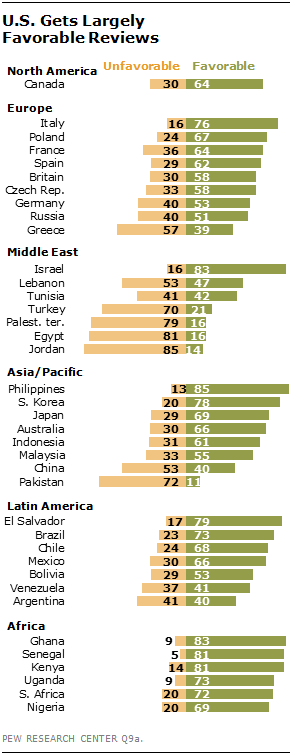 Overall, global attitudes toward America are positive. In 28 of 38 nations, half or more of those surveyed express a favorable opinion of the U.S.
Overall, global attitudes toward America are positive. In 28 of 38 nations, half or more of those surveyed express a favorable opinion of the U.S.
Europeans generally give the U.S. high ratings, especially in Italy, where 76% now have a positive view of America, up from 74% last year and 53% in 2007. Greece is the only European country polled where fewer than half offer a positive assessment of the U.S.
In both France and Germany, ratings for the U.S. are much higher today than they were during President George W. Bush’s tenure, but they have also declined somewhat since 2009, the first year of Barack Obama’s presidency.
About eight-in-ten Israelis (83%) have a favorable opinion of the U.S., although there are large differences between the country’s Jewish (90% favorable) and Arab (42%) communities. Elsewhere in the Middle East, ratings are much more negative. Less than one-in-five Palestinians, Egyptians, and Jordanians offer a favorable opinion. Tunisians are somewhat more positive (42%), as are Lebanese (47%). In Lebanon, however, views differ considerably among Lebanese Sunni Muslims (66% favorable), Christians (56%), and Shia Muslims (9%). The U.S. continues to receive largely negative ratings in Turkey, although the percentage of Turks with a positive view of the U.S. has risen six percentage points since last year.
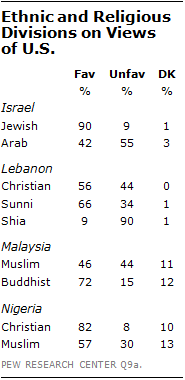 The U.S. receives largely positive ratings in most of the nations surveyed in the Asia/Pacific region. This is especially true in the Philippines, South Korea, Japan, and Australia, where about two-thirds or more hold this view. The U.S. also gets mostly favorable marks in the predominantly Muslim nations of Indonesia and Malaysia. In Malaysia, where positive views of the U.S. have more than doubled since the last time Pew Research polled there in 2007, the minority Buddhist community (72% favorable) expresses more positive attitudes than the country’s Muslim population (46%).
The U.S. receives largely positive ratings in most of the nations surveyed in the Asia/Pacific region. This is especially true in the Philippines, South Korea, Japan, and Australia, where about two-thirds or more hold this view. The U.S. also gets mostly favorable marks in the predominantly Muslim nations of Indonesia and Malaysia. In Malaysia, where positive views of the U.S. have more than doubled since the last time Pew Research polled there in 2007, the minority Buddhist community (72% favorable) expresses more positive attitudes than the country’s Muslim population (46%).
There are, however, two exceptions in Asia: China and Pakistan. Chinese attitudes have changed significantly over the past three years – in 2010, 58% had a favorable opinion of the U.S., compared with 40% now. Meanwhile, anti-Americanism has been widespread in Pakistan in recent years, and today just 11% have a favorable view.
The U.S. receives mostly favorable ratings in Latin America, particularly in El Salvador, Brazil, Chile and Mexico. Brazilians and Mexicans have become notably more positive toward the U.S. in just the past year. Even in Bolivia and Venezuela, two countries where national leaders have regularly engaged in anti-American rhetoric over the past few years, the U.S. on balance gets positive marks, although in both countries ratings are higher among people on the political right than among those on the left. The exception in Latin America is Argentina, where just 41% express a favorable view, although this is still much more positive than the 16% registered in 2007.
As has been the case in previous years, Africans overwhelmingly offer favorable assessments of the U.S. In all six sub-Saharan African nations polled, roughly seven-in-ten or more see America in a positive light. This includes the four largely Christian nations of Uganda, Ghana, Kenya and South Africa, as well as predominantly Muslim Senegal. In Nigeria, where the population is almost evenly divided between Christians and Muslims, majorities of both groups have a favorable opinion of the U.S., although this view is more common among Christians (82%) than Muslims (57%).
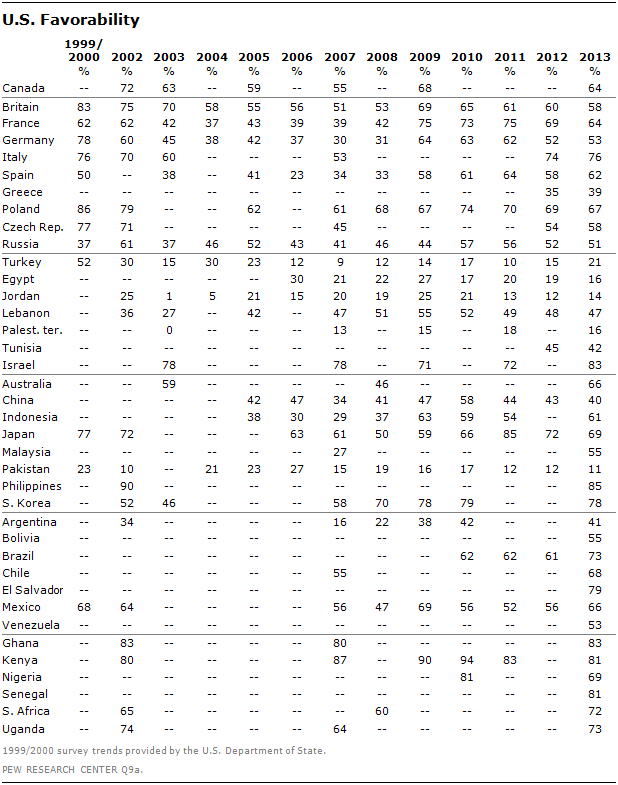
Young People Give U.S. Higher Marks
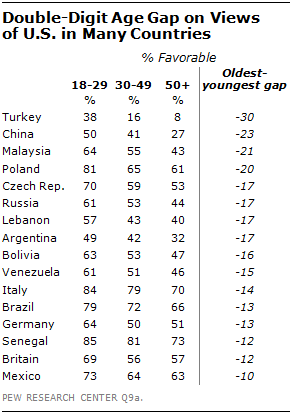 In many of the nations surveyed, people under age 30 are especially likely to have a positive view of America. This is particularly true in Turkey, where 38% of 18- to 29-year-olds give the U.S. a favorable rating, compared with just 8% of Turks age 50 and older.
In many of the nations surveyed, people under age 30 are especially likely to have a positive view of America. This is particularly true in Turkey, where 38% of 18- to 29-year-olds give the U.S. a favorable rating, compared with just 8% of Turks age 50 and older.
Half of those under age 30 in China have a favorable view, compared with just 27% among people 50 and older. Similarly, in Malaysia there is a 21 percentage point gap between 18-to 29-year-olds and those 50 and older. Double-digit age gaps also appear in a variety of countries from Europe, the Middle East, Latin America and Africa.
In several nations, the college educated also express more positive attitudes toward the U.S. For example, 60% of Chinese with a college degree give the U.S. a positive rating, compared with just 39% of those with less education. In Russia, 60% of people with a college degree express a favorable opinion, while just 48% hold this view among those who have not graduated from college. There are also double-digit education gaps in Pakistan, Venezuela and Tunisia.
Rating the American People
Attitudes toward the American people are highly correlated with overall views of the U.S. In 29 of 38 countries, at least half of those surveyed express a favorable opinion of Americans. Three-in-four or more hold this view in a diverse set of nations: the Philippines, Ghana, South Korea, Israel, Senegal, Kenya and El Salvador.
Ratings are lowest among the predominantly Muslim publics of Pakistan, Turkey, the Palestinian territories, Jordan and Egypt. However, it is worth noting that the American people receive significantly higher ratings than the U.S. in general among both Egyptians (Americans 32% favorable, U.S. 16%) and Jordanians (Americans 31%, U.S. 14%).
China is the only other country where more than half (54%) express an unfavorable opinion of the American people.
Many See U.S. as Partner
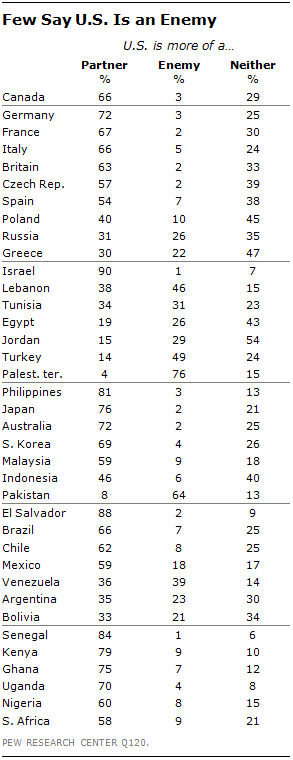 When asked whether they think of the U.S. as a partner to their country, an enemy, or neither, clear majorities in 22 nations say it is a partner. And the U.S. is seen as an enemy by clear majorities or pluralities in only four of the nations included in the survey.
When asked whether they think of the U.S. as a partner to their country, an enemy, or neither, clear majorities in 22 nations say it is a partner. And the U.S. is seen as an enemy by clear majorities or pluralities in only four of the nations included in the survey.
Seeing America as a partner is especially common in Africa, where majorities in all six nations surveyed hold this view. Majorities in five of the eight EU countries polled also describe the U.S. as a partner. However, only 30% of Greeks express this opinion, while roughly one-in-five (22%) say the U.S. is an enemy.
Russians are closely divided: 31% consider the U.S. a partner, but nearly as many (26%) see it as an enemy, and 35% believe it is neither.
Among Middle Eastern nations, only Israelis think of the U.S. as a partner (90% hold this view). In contrast, 76% of Palestinians consider the U.S. an enemy, the highest percentage among the nations surveyed. Nearly half of Turks (49%) see America as an enemy, as do 46% of Lebanese. But views in Lebanon vary considerably among the country’s religious communities, with 86% of Shias, 38% of Christians, and 25% of Sunnis describing the U.S. as an enemy.
Majorities in five of seven Asia/Pacific nations think of the U.S. as a partner, and, with one major exception, very few say it is an enemy. The exception is Pakistan, where 64% describe America as an enemy.
In Latin America, most Salvadorans, Brazilians, Chileans and Mexicans consider the U.S. a partner. About a third express this view in Argentina and Bolivia, although in both
nations, people are more likely to think of the U.S. as a partner than as an enemy. Venezuelans are divided, however, with roughly equal numbers saying partner and enemy.
In China, where a different version of the question was asked, 32% describe the relationship between the U.S. and China as one of cooperation, down sharply from 68% in 2010. Today, 23% say the relationship is one of hostility, up from 8% three years ago. About one-in-three (31%) say it is neither cooperative nor hostile, and 15% have no opinion.
Does the U.S. Listen to Other Countries?
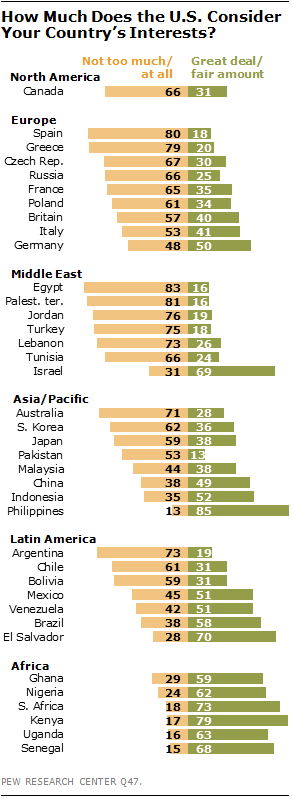 Around the world, many believe the U.S. acts in its own self-interest in global affairs, ignoring other countries. Majorities throughout nearly all of the European and Middle Eastern nations polled say America does not consider the interests of countries like theirs when making foreign policy decisions.
Around the world, many believe the U.S. acts in its own self-interest in global affairs, ignoring other countries. Majorities throughout nearly all of the European and Middle Eastern nations polled say America does not consider the interests of countries like theirs when making foreign policy decisions.
Germany and Israel are the exceptions in these two regions. Germans are almost evenly divided between those who think the U.S. considers other nations and those who do not believe this. Meanwhile, 69% of Israelis say the U.S. considers their interests.
Opinions are divided in Asia. Filipinos overwhelming think the U.S. considers their interests, and on balance, Indonesians and
Chinese tend to agree. Views are split in Malaysia, while the Japanese, South Koreans, Australians and Pakistanis believe the U.S. acts unilaterally.
Throughout the African nations surveyed, most think the U.S. considers their interests, and at least half say the same in four of the seven Latin American countries polled. However, most Bolivians, Chileans and Argentines believe the U.S. does not consider their interests.
For their part, Americans see this issue quite differently: 70% say their country does take into account the interests of other nations when it is making decisions about foreign policy.
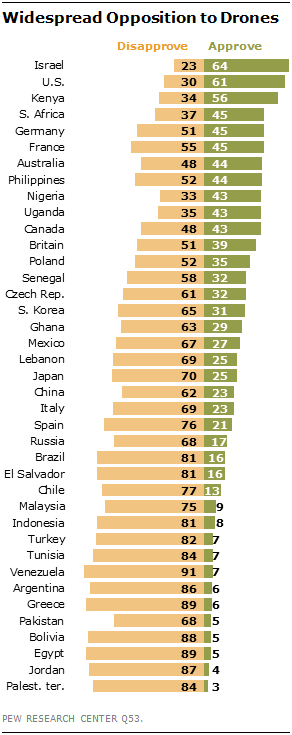
Drone Strikes Widely Unpopular
In most of the nations polled, there continues to be extensive opposition to the American drone campaign against extremist leaders and organizations. In 31 nations, at least half disapprove of the U.S. conducting drone missile strikes targeting extremists in places such as Pakistan, Yemen and Somalia. At least three-in-four hold this view in 15 countries from all corners of the world, including nations from the Middle East, Europe, Latin America and Asia.
The only three countries where majorities support the drone campaign are Israel (64% approve), Kenya (56%), and the U.S. itself (61%). In the U.S., Republicans (69% approve) are especially likely to endorse this policy, although most independents (60%) and Democrats (59%) also approve.
Opinions on this issue are essentially divided in Australia, Canada and Germany. German support for U.S. drone attacks has actually risen slightly since last year – today, 45% approve, compared with 38% in 2012. Although most in France still oppose the drone strikes, support has also increased there, rising from 37% last year to 45% now.
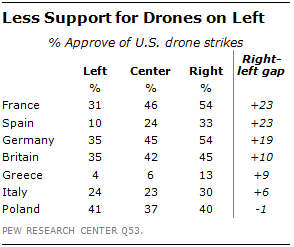 In France, Germany and Spain, there are sharp ideological divisions on this issue, with those on the political right far more supportive of U.S. drone strikes than those on the left side of the political spectrum.
In France, Germany and Spain, there are sharp ideological divisions on this issue, with those on the political right far more supportive of U.S. drone strikes than those on the left side of the political spectrum.
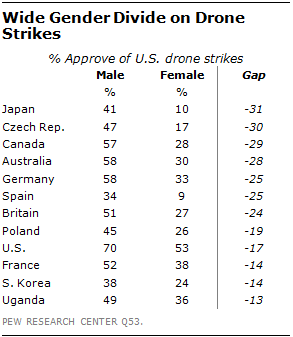 Views about drones also differ sharply along gender lines in many countries. For instance, in Japan, 41% of men approve of the drone attacks, compared with just 10% of women. Double digit gender gaps are also found in six of the eight EU nations polled, as well as Australia, Canada, the U.S., South Korea and Uganda.
Views about drones also differ sharply along gender lines in many countries. For instance, in Japan, 41% of men approve of the drone attacks, compared with just 10% of women. Double digit gender gaps are also found in six of the eight EU nations polled, as well as Australia, Canada, the U.S., South Korea and Uganda.
American Culture and Ideas
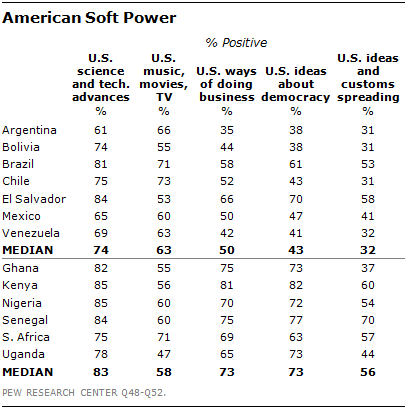 Across the African nations surveyed, publics embrace key elements of American soft power. And throughout much of Latin America, people tend to agree, although U.S. soft power has somewhat less appeal in Argentina, Bolivia and Venezuela.
Across the African nations surveyed, publics embrace key elements of American soft power. And throughout much of Latin America, people tend to agree, although U.S. soft power has somewhat less appeal in Argentina, Bolivia and Venezuela.
America’s achievements in science and technology are a particularly strong aspect of its international image. Solid majorities in all seven Latin American countries and all six African nations polled admire the U.S. for its scientific and technological advances.
American music, movies and television are also widely popular. The only nation surveyed in which less than half say they like American pop culture is Uganda, where just under half (47%) hold this view.
In Africa, U.S. ways of doing business are very popular, but reviews are more mixed in Latin America. At least half of Salvadorans, Brazilians, Chileans and Mexicans like American-style business, but only 44% of Bolivians, 42% of Venezuelans, and 35% of Argentines do.
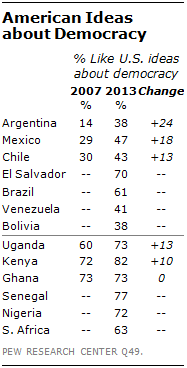 Similarly, American ideas about democracy are popular in Africa but have less appeal in Latin America. El Salvador and Brazil are the only countries in the region where majorities say they like U.S. ideas about democracy. But American-style democracy is more popular today in the three Latin American countries where trends are available from 2007. The appeal of these ideas is also stronger today in Uganda and Kenya.
Similarly, American ideas about democracy are popular in Africa but have less appeal in Latin America. El Salvador and Brazil are the only countries in the region where majorities say they like U.S. ideas about democracy. But American-style democracy is more popular today in the three Latin American countries where trends are available from 2007. The appeal of these ideas is also stronger today in Uganda and Kenya.
Even in countries where many aspects of America’s image are popular, there are concerns about the reach of U.S. influence. Just 44% of Ugandans and 37% of Ghanaians think it is a good thing that U.S. ideas and customs are spreading to their country. Only about a third of Argentines, Bolivians, Chileans and Venezuelans hold this opinion.
Still, most in Senegal, Kenya, South Africa and Nigeria welcome the spread of American culture, as do most in El Salvador and Brazil.
Across all of these questions about American culture and ideas, young people regularly express more positive attitudes. This is especially true regarding impressions of U.S. pop culture. For instance, 72% of 18- to 29-year-old Bolivians like American music, movies and television, compared with 51% of 30- to 49-year-olds and 32% of people 50 and older. There is a similar age gap in Senegal, where 77% of those under age 30 like U.S. pop culture, while 59% of 30- to 49-year-olds and 33% of those 50 and older agree.
U.S. Economic Aid
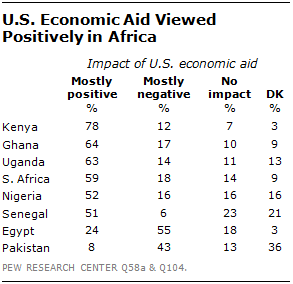 Throughout the sub-Saharan African countries surveyed, the U.S. receives positive marks for the economic assistance it provides. At least half in all six countries say American economic aid is having a mostly positive impact on their countries, and more than six-in-ten hold this view in Kenya, Ghana and Uganda.
Throughout the sub-Saharan African countries surveyed, the U.S. receives positive marks for the economic assistance it provides. At least half in all six countries say American economic aid is having a mostly positive impact on their countries, and more than six-in-ten hold this view in Kenya, Ghana and Uganda.
However, in Egypt and Pakistan, two nations that are major recipients of U.S. assistance, evaluations are very different. A 55% majority of Egyptians say American economic aid is having a mostly negative effect on their country. In Pakistan, 43% think the impact is mostly negative, while just 8% say it is positive.


 Country Coverage
Country Coverage Maps
Maps Map
Map Map
Map